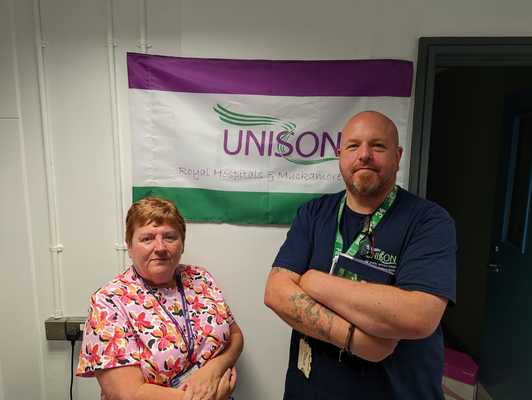SINN Féin’s Órlaithí Flynn topped the poll in West Belfast in the 2017 Assembly Election and will look to return to Stormont following the May 5 contest.
Co-opted as an MLA in 2016, Ms Flynn retained her seat the following year after the Executive collapsed over the RHI scandal forced another election.
She previously worked as a political adviser to a succession of local Sinn Féin MLAs, and is one of four candidates standing for the party in West Belfast next week.
Sitting down with the Andersonstown News, Ms Flynn said the “pressing issues” in the election are, unsurprisingly, “health and the cost-of-living".
“People are struggling with the burden of paying their bills, heating their homes and putting food on the table,” she said of the latter.
She spoke to the urgency of parties to get “back to work immediately” after the poll.
“From day one after the election Sinn Féin will be ready to go back into government, to go back into the Executive,” she said.
“What we need to do then is put into action the implementation of urgent interventions to deal with cost-of-living and the health service.”
On dealing with the cost-of-living crisis, the Sinn Féin candidate raised Communities Minister Deirdre Hargey’s role in the implementing the Home Heating Payment, which she said saw £120million go to some 270,000 families.
“That alleviated a lot of pressure on families with low incomes,” adding, “we know that’s not enough, and we need to expand that programme”.
“There was a bid made by Deirdre for £83million and that money couldn’t be allocated because the DUP had walked away and collapsed the Executive.”
She continued: “Hopefully elected reps will go back into Stormont after the Assembly election and we need an extension of that programme so that it’s not just the 270,000 people, but we’re extending it right across society.”
I am honoured to have been selected to contest the upcoming Assembly election in West Belfast.
— Órlaithí Flynn (@OrlaithiF_MLA) March 2, 2022
Every day I work hard to give a voice to families, workers and communities & to better people’s lives.
Let’s continue to drive West Belfast forward & build a better future for us all. pic.twitter.com/X0zIYnfCGd
Ms Flynn outlined a host of measures Sinn Féin are advocating to deal with spiralling prices.
Amongst these is a call for the British Government to tax energy firms “and then use some of that money to go back into the pockets of workers and families.”
Her party are also calling for a reduction in VAT for domestic energy bills and a cut to fuel duty. If implemented these will help alleviate the financial stresses that people are under at the moment, she added.
On the next Assembly, Ms Flynn said Sinn Féin’s aim “is to prioritise health”.
“We are proposing an additional £1 billion over the next three years that will specifically go into the health service to help recruit and retain more doctors and nurses,” she said.
“It will also fund the cancer and mental health strategies, which are really important strategies, especially for people in West Belfast. That will basically help transform the health service and deal with the waiting lists, which are out of control.”
The additional money allocated to the health service under the draft budget will see funding for every other department slashed. Asked about the impact of these cuts, Ms Flynn said there was a “broad acceptance” by the parties “that the pressures the health service is under needs to be dealt with.”
“The only way to do that is by prioritising health and ringfencing money that you can set aside to help the health service,” she stated.
“You always have difficult decisions to make whenever you’re in government and you need to bear in mind that we’re still working from a block grant that we’re given by the British Government. So we are limited in terms of what we can spend and what we can do.”
Stormont departments, including the Department of Health, have drawn criticism for handing unspent funds back to Westminster.
“It has been recognised that you are constrained in terms of the block grant as to what you can do, what you can spend, when you can spend it,” Ms Flynn responded to this issue.
“Conor Murphy did a piece of work, when he was in the Department of Finance, with the Fiscal Commission and they’re due a report early into the next mandate. That’s looking at different measures and options for ways we can have our own tax-raising powers. That’s the kind of conversations that we need to start having as opposed to money being handed back.”
Successive Executives have seen hospital beds reduced by 10 per cent overall and 20 per cent in Belfast between 2011 and 2019. Asked about this record, Ms Flynn said the reduction is a result of “Tory austerity”.
“Rather than characterise how the Executive has dealt with it, I would say that over the past 10 years the Health Service has come under extreme pressure and the main reason for that has been 10 years of Tory austerity,” she said.
“There has been a domino effect as a result of the austerity that the Tories have imposed on our block grant, and particularly on our health service. When you couple that with two years of a very difficult pandemic, I think that is why it is clear for everyone to see that the health service is under extreme pressure.”
During her time at Stormont, Ms Flynn was and is Sinn Féin’s mental health spokesperson. She spoke of the “important pieces of work” involved in the government’s Suicide Prevention Strategy (Protect Life 2), Substance Use Strategy, and its 10-year Mental Health Strategy.
Stormont’s Protect Life 2 Strategy commits to reducing suicides by 10 per cent. Ms Flynn admits this “isn’t enough”.
“The important thing for me is rather than talking about if the strategy is good enough, the strategies that we have are there, must be funded and must be implemented,” she said.
“There was funding set aside and ringfenced to ensure that the first three years of the mental health strategy would have been fully funded.
“It is a desperate situation that we didn’t get to sign off that draft budget because the DUP walked away and left the Executive.
“The fact is we could’ve made progress on that 10-year mental health strategy already. That hasn’t been done. That has to be a major priority for every single political party”.
Polls suggest there is a “very real” prospect of Sinn Féin being the largest party in the North, casting doubt over whether the DUP will serve under a nationalist First Minister.
Ms Flynn said this could be the “biggest democratic test for the DUP”.
“No matter what the outcome of the election is, no matter what our mandate is, Sinn Féin and our leadership have made it clear that we will be back to work directly after the election,” she said.
“If we are returned as the largest party, and it is an if, it is down to the DUP to practice democracy and to come back into government".







